Prime Minister Benjamin Netanyahu said Tuesday that he is ready to “hear counter offers” to his contentious plan to radically overhaul Israel’s independent judiciary, while still defending the proposed legal shake-up to counter what he called “extreme judicial activism.”
The prime minister said Israel needed “a strong independent judiciary, but an independent judiciary doesn’t mean an unbridled judiciary,” in a wide-ranging interview with CNN that aired Tuesday for over an hour. The interview also covered Iran’s nuclear ambitions and Israel’s efforts to thwart them, his new governing coalition with far-right ministers, the Israeli-Palestinian conflict and prospects for peace, Russia’s ongoing war on Ukraine, and the recent violence in Jerusalem and the West Bank.
A democracy needs “balance between three branches of government; in Israel, that balance has been thrown askew,” claimed Netanyahu, once again insisting that the proposed changes will “make Israel’s democracy stronger.”
The Netanyahu coalition’s proposals, as presented by Justice Minister Yariv Levin, would severely restrict the High Court’s capacity to strike down laws and government decisions, with an “override clause” enabling the Knesset to re-legislate struck-down laws with a bare majority of 61; give the government complete control over the selection of judges; prevent the court from using a test of “reasonableness” to judge legislation and government decisions; and allow ministers to appoint their own legal advisers, instead of getting counsel from advisers operating under the aegis of the Justice Ministry.
The proposals have come under intense criticism across the board in Israel, with leading financial and legal experts warning that the judicial overhaul will harm democracy and the economy. Mass protests have been held and public petitions have been drafted by various officials, professionals, prominent economists, businesses, academics, the vaunted Israeli tech sector and others.
In his interview, Netanyahu argued that Levin’s proposals have existing “safety” provisions but critics “don’t want to hear” about them. Some of the critics’ concerns are “driven by a lack of understanding, a lack of information,” but some criticism is just “sloganeering…frankly by political opponents who lost the election,” he said.
The prime minister pointed to other parliamentary democracies like Canada and New Zealand where, he said, the courts have “no ability” to strike down laws passed by parliament.
Netanyahu denied that the proposed judicial shake-up was driven by a desire to defang the judiciary in order to save himself from prison, potentially, amid his ongoing corruption trial, which he said was “unraveling.”
The prime minister is on trial in three corruption cases, facing charges of fraud, breach of trust and bribery. He denies wrongdoing and claims, without offering evidence, that the charges were fabricated in an attempted political coup led by the police, the state prosecution, the media, and leftist rivals.
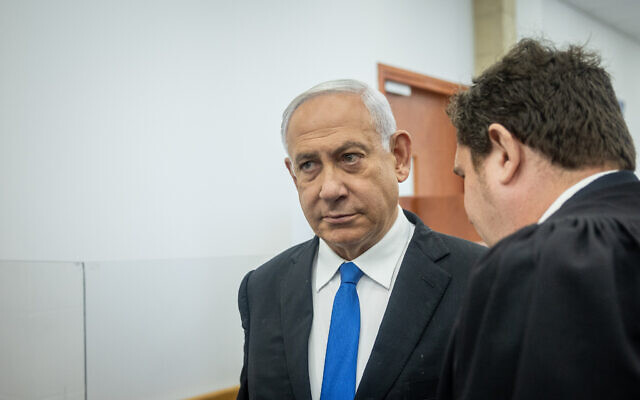
File: Incoming Israeli prime minister Benjamin Netanyahu arrives for a court hearing in his trial, at the District Court in Jerusalem on May 31, 2022. (Yonatan Sindel/Flash90)
“None of the reforms that we’re talking about…have anything to do with my trial,” Netanyahu said, arguing that the ongoing legal process against him was not an issue in the November elections, which handed his Likud party and its far-right and ultra-Orthodox partners 64 seats in the 120-member Knesset.
The premier said he “respectfully” disagrees with critics like Alan Dershowitz — who said the overhaul would make defending Israel on the global stage harder — and held that the radical, sweeping changes, would bring Israel “in line with most of the democracies of the world.”
“Israel is right now an outlier, Israel has the most extreme judicial activism that’s gone off the rails and we’re trying to bring it back to where just about all the democracies are, both in the selection of judges and the balance between the various branches of government,” Netanyahu said.
“Correcting or restoring Israeli democracy will make democracy stronger, [the] judiciary will remain independent, the rule of law will remain independent. Property rights, which I hold sacrosanct, [the] independent enforcement of contracts, it’s [all] going to be there,” he went on.
Turning to his coalition — the most right-wing and religious in Israel’s history — Netanyahu quipped that Finance Minister Bezalel Smotrich of the Religious Zionism party and National Security Ministry Itamar Ben Gvir, of Otzma Yehudit, “got more seats than the previous prime minister,” in reference to former premier Naftali Bennett whose now-defunct New Right alliance nabbed just seven seats in the 2021 elections and went on to form a short-lived but broad coalition with Yair Lapid’s Yesh Atid, Arab party Ra’am, and others.
Reiterating previous remarks on his new far-right ministers, Netanyahu said, “They joined me, I didn’t join them, and I direct policy and I think my records both on peace, on democracy, on the economy, on everything else has been very, very successful and Israeli people think it’s successful; that’s why they voted for me again and again.
“I’m controlling the government and I’m responsible for its policies and the policies are sensible and responsible and continue to be that,” he added.
Amid a recent surge in violence with the Palestinians, Netanyahu vowed to take “focused action” against terrorists but emphasized, “I don’t believe in collective punishment.”
“And so you want to target them, but keep the economy going. Keep the 150,000 Palestinians working in Israel — I haven’t closed it even for a minute, and I don’t intend to,” he said.
An ‘inside-out’ plan for peace
Netanyahu was asked if measures advanced by the cabinet in the wake of a terror shooting in Jerusalem over the weekend in which seven Israelis were killed — the deadliest attack on Israelis in over a decade — were appropriate, after US Secretary of State Antony Blinken and other world leaders urged the government to “bring down the temperature.”
Those measures include advancing West Bank settlement construction, potentially revoking the residency or citizenship of terrorists’ relatives, and deporting them to territory controlled by the Palestinian Authority.
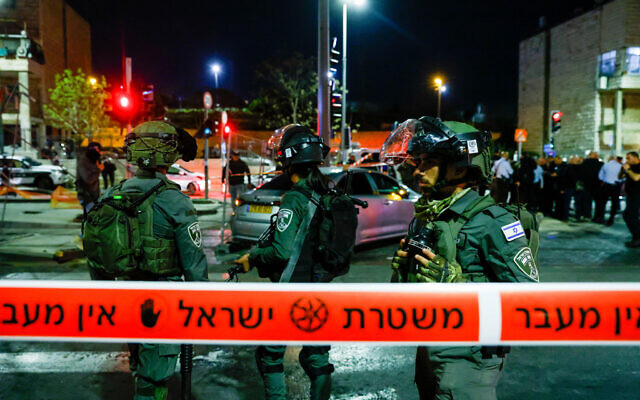
Security and rescue forces at the scene of a deadly terror shooting attack in Neve Yaakov, Jerusalem, January 27, 2023. (Olivier Fitoussi/Flash90)
Netanyahu said the moves only targeted relatives who supported terrorist acts and would serve to disincentivize terrorists. He also claimed he has “the best record of any Israeli prime minister in containing” terrorism.
Netanyahu blamed the recent surge of violence on the PA, which “was not really exercising its power to fight the terrorists,” forcing the IDF to take action in the West Bank.
“And I think you have to understand these terrorists are then celebrated, are paid by the Palestinian Authority,” the prime minister said, referencing the so-called pay-for-slay policy, which also provides stipends for relatives of terrorists.
Netanyahu disagreed that West Bank settlement expansion is an obstacle to peace, stating that Jews and Palestinians are “going to have to live together.”
“We’re not going to ethnically cleanse the heartland of the Jewish people, we’re not going to ethnically cleanse Israel,” he said, saying that neither group should be removed.
He emphasized that the only path to resolve the conflict was to hold “peace negotiations with the Palestinians consistently.”
Netanyahu outlined his vision for peace, stating that he wanted an “inside-out” approach, first securing deals with more Arab states, such as Saudi Arabia, then “circling back around” to the Palestinians.
In that light, Netanyahu hailed the 2020 Abraham Accords, which defied assumptions by many policymakers that Israel would need to secure a deal with the Palestinians before it could normalize relations with more Arab and regional states.
The deal forged ties between the Jewish state, the United Arab Emirates, and Bahrain in 2020. Morocco normalized ties with Israel separately later on. Sudan symbolically signed on to the accords but has yet to officially normalize ties with Jerusalem.
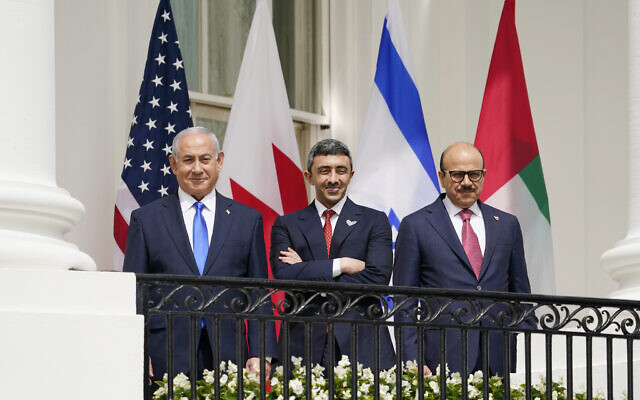
Then-prime minister Benjamin Netanyahu, United Arab Emirates Foreign Minister Abdullah bin Zayed al-Nahyan, and Bahrain Foreign Minister Khalid bin Ahmed Al Khalifa, stand on the Blue Room Balcony during the Abraham Accords signing ceremony on the South Lawn of the White House on September 15, 2020, in Washington. (AP Photo/Alex Brandon)
Asked if he believed in a two-state solution, Netanyahu said: “I wouldn’t call it that.” He said a future deal with the Palestinians would afford them “all the powers they need to govern themselves, but none of the powers that can threaten us,” while emphasizing that Israel would hold security responsibilities in the region.
On previous rounds of peace negotiations, Netanyahu lamented that “we didn’t get the Palestinians very far.”
Recalling an attempt by former US president Barack Obama to start talks, Netanyahu said he met with Palestinian Authority President Mahmoud Abbas in the Oval Office and was willing to begin negotiations. According to the premier, the PA president said, “Let me think about it, and he never came back.” He noted that Abbas had yet to condemn Friday’s deadly shooting in Jerusalem.
Netanyahu also called the Palestinians “the pampered child of the international community,” claiming that other countries have not done enough to call out Palestinian incitement and antisemitism.
Fears that Israel would change the status quo on the flashpoint Temple Mount site were all “hype,” Netanyahu said, despite past remarks by National Security Minister Ben Gvir on the subject, and Ben Gvir’s recent visit to the site.
“I’m very, very strict on this because it’s outside our window here in Jerusalem, it’s the most potentially explosive square mile on Earth, on the planet,” Netanyahu said.
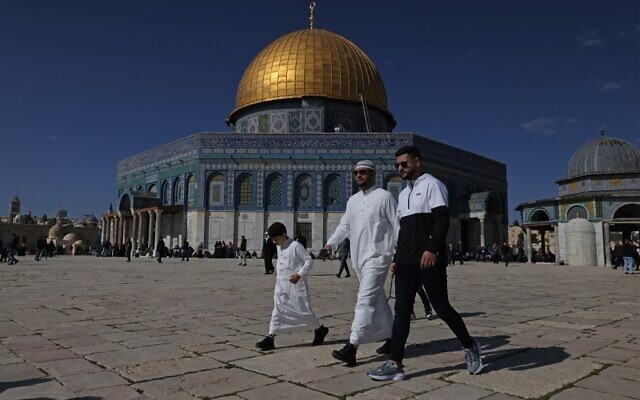
Palestinians gather in the Al-Aqsa mosque compound on the Temple Mount before the Friday noon prayer in Jerusalem on January 27, 2023. (Photo by AHMAD GHARABLI / AFP)
The Temple Mount is revered by Jews as the historic location of the two Jewish Temples, making it Judaism’s holiest site. It is also the third-holiest for Muslims, who refer to it as the Al-Aqsa Mosque or the Noble Sanctuary.
Provocations and violence at the site have frequently sparked into wider conflagrations.
Despite Ben Gvir’s combative rhetoric ahead of the elections on legalizing Jewish prayer at the Temple Mount, he agreed to maintain the status quo there in coalition agreements reached with Netanyahu before the government was sworn in.
The national security minister has long been an advocate of formally altering the Temple Mount status quo, by which Muslims are allowed to pray and enter with few restrictions, and Jews can visit only during limited time slots via a single gate and walk on a predetermined route, closely accompanied by police. Jews are not allowed to pray at the site, though recent years have increasingly seen police allow some silent prayer.
“It’s only under Israeli sovereignty that we’ve allowed free and unfettered access to all three faiths and will continue to do that and we’ll keep the status quo,” the prime minister said.
Goals for a sixth term
The prime minister, who in late December began his sixth term in office, said he had “three overriding goals” for his tenure: “One is to thwart Iran’s nuclear ambitions, the second is to expand peace dramatically to end the Arab-Israeli conflict as a lead into ending the Israeli-Palestinian conflict, and the third is to further boost Israel’s incredible economy.”
Netanyahu, once again, vowed to do everything “in my power as Israel’s prime minister to prevent Iran from getting a nuclear arsenal that is expressly directed at annihilating us.”
“And they also say not only ‘death to Israel’ but ‘death to America’,” he added.
Asked whether Israel was behind a drone attack on a defense facility in the Iranian city of Isfahan over the weekend, Netanyahu said he “never talks about specific operations,” with some exceptions like the 2018 raid on Iran’s secret nuclear archive.
“Every time some explosion takes place in the Middle East, Israel is blamed or given responsibility… Sometimes we are [behind strikes], sometimes we’re not, but I will say that there is an overriding mission” to thwart Iran’s nuclear ambitions.
“The only way that you can stop a rogue state from getting nuclear weapons is a combination of crippling economic sanctions” and “the most important thing is a credible military threat,” he went on. “And if this deterrence fails, you have no choice but to take action.”
Israel and the United States, Netanyahu said, have been moving “closer together” on the Iranian issue, some eight years after the two countries butted heads over the 2015 US-brokered international agreement aimed at curbing Iran’s nuclear advancement in exchange for sanctions relief. Netanyahu famously clashed with Obama and his administration on that issue and loudly voiced his opposition to the nuclear accord, which US President Joe Biden sought to rejoin after his predecessor Donald Trump pulled the US out of the deal in 2018.
“The world is moving closer to understanding what this Iran is: barbarism against their own people, the fact that they’re supplying drones that kill innocent people in the heart of Europe, in Ukraine,” he said in reference to Tehran’s provision of locally made suicide drones to Russia for the Kremlin’s use in its nearly year-long invasion.
“People understand, they recognize how dangerous this regime would be with nuclear weapons, and I think there are two aspects to preventing such an outcome; one is recognition and the other is action,” he said.
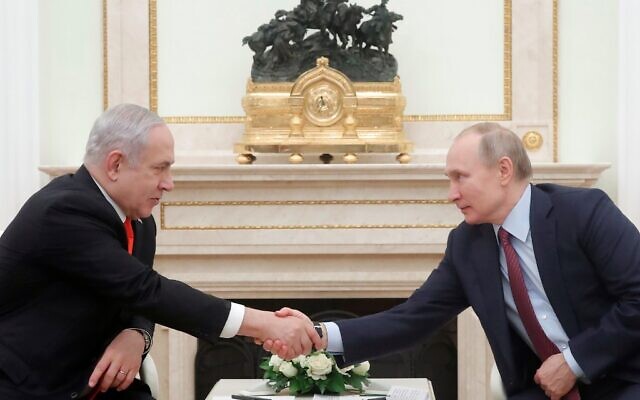
File: Russian President Vladimir Putin meets with then-Prime Minister Benjamin Netanyahu at the Kremlin in Moscow on January 30, 2020. (MAXIM SHEMETOV / POOL / AFP)
Weapons to Ukraine?
On Ukraine, Netanyahu said he was “looking into” providing the country with “other kinds of aid” besides humanitarian help, amid concerns over Israel’s “complex relationship” with Russia and its need to retain “freedom of action” in Syria in its effort to “keep Iran in check.”
Israel has so far refused to provide military aid to Kyiv, out of apparent concern for Russia’s reaction. One major reason for Israel’s hesitance appears to be its strategic need to maintain freedom of operations in Syria, where Russian forces largely control the airspace.
“Just miles from here, on our northern border in Syria, Israeli aircraft and Russian aircraft are flying within spitting distance of each other,” he said, adding that Israel has “no desire to enter into a Russian-Israeli military confrontation.”
“Iran is trying to plant itself in Syria right next to our northern border, the way they did in Lebanon with Hezbollah. I’ve adopted a policy over the last 7-8 years to militarily hit Iran’s military installation. They wanted to build an army here of 100,000 Shiite militia commanded by Iranian generals and we’ve systematically degraded them,” he explained.
“Israel needs to have freedom of action in the air… I was very open with [Russian President Vladimir] Putin about that. We can clash or we can make sure that we coordinate in such a way that our air forces do not clash.” he went on.
At the same time, Netanyahu said, Israel “acts in ways, that I will not itemize here, against Iran’s weapons productions which are used against Ukraine.”
Israel is not only trying to thwart Iran’s nuclear program, but is “also taking action against certain weapons development that Iran has, and Iran invariably exports them.”
“Realistically, Israel in confronting Iran is also confronting the main partner of Russia” in its war on Ukraine, he said.
Some reports have said that the alleged Israeli strike over the weekend in Isfahan targeted Iran’s suicide drone program.
Asked if he would consider mediating between Ukraine and Russia given Israel’s ties with both countries, the prime minister said he’d been asked before and would “do it now if I’m asked by both sides and frankly if I’m asked by the United States.”
“The peace of the world is at stake, as I think the peace of the world is at stake with Iran getting nuclear weapons,” he said. “It will destabilize the entire world.”
"hear" - Google News
February 01, 2023 at 02:38PM
https://ift.tt/wmxhGH4
Netanyahu says he wants to hear ‘counter offers’ to proposed judicial overhaul - The Times of Israel
"hear" - Google News
https://ift.tt/lqji5Gc
https://ift.tt/DPHJzqn
Bagikan Berita Ini














0 Response to "Netanyahu says he wants to hear ‘counter offers’ to proposed judicial overhaul - The Times of Israel"
Post a Comment